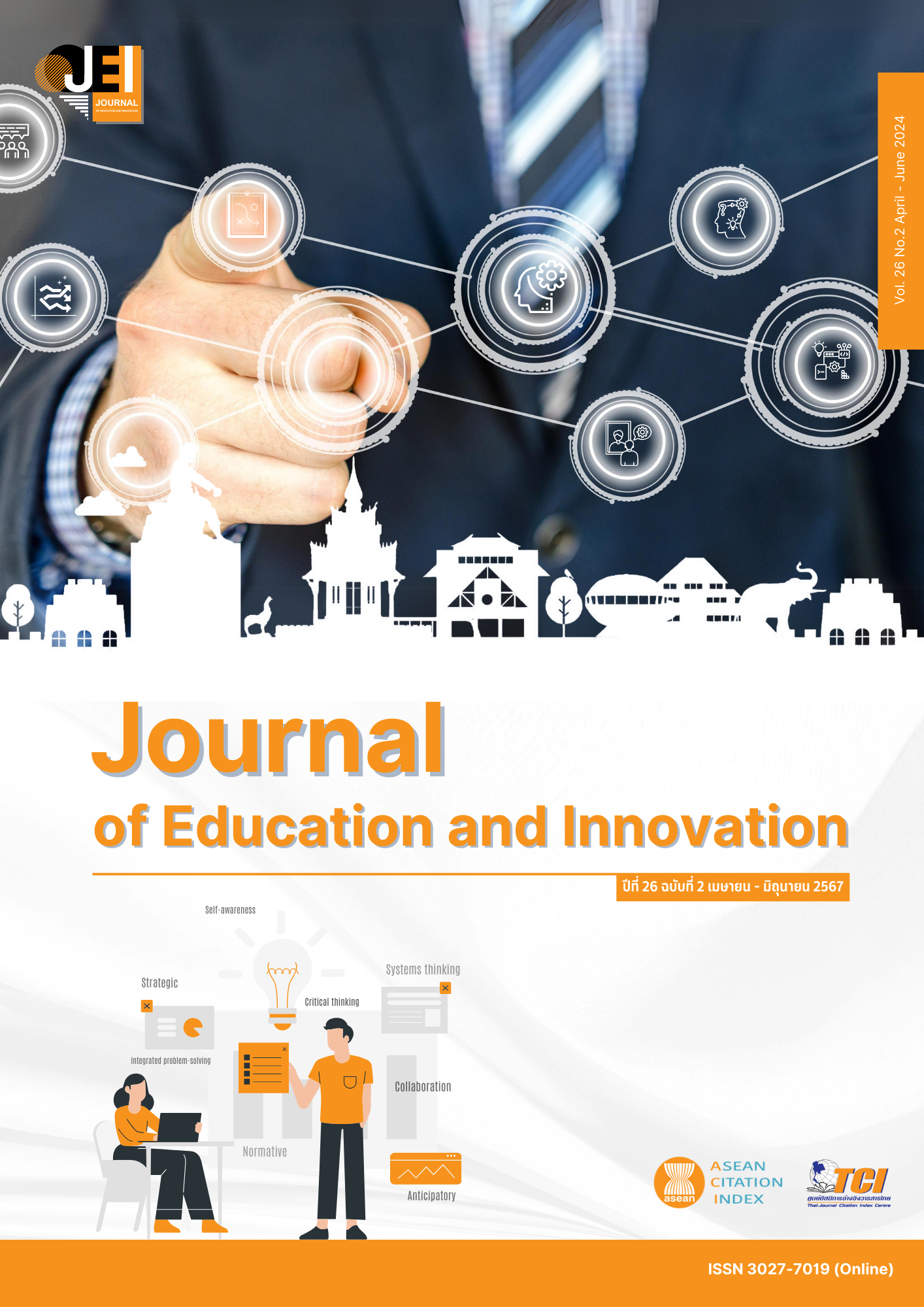THE EFFECTS OF LEARNING ACTIVITIES USING INQUIRY AND REFLECTION WITH THE GEOGEBRA ON MATHEMATICAL CONCEPTUAL KNOWLEDGE GRAPH OF QUADRATIC FUNCTION OF NINTH GRADE STUDENTS
Main Article Content
Abstract
The purposes of this research were 1) to compare the students’ mathematical concepts on the graph of a quadratic function of ninth grade students after learning using inquiry and reflection with GeoGebra with 70 percent criteria and 2) to study guidelines for learning activities using inquiry and reflection with GeoGebra to promote mathematical concepts. The samples for this research consisted of 36 ninth grade students from a large school in Nonthaburi province selected through Cluster Random sampling. The research instruments used in the study consisted of 7 lesson plans for learning activities using inquiry and reflection with GeoGebra on graphs of quadratic functions and a test of mathematical concepts. The statistics for data analysis were mean, percentage, standard deviation, and t-test for one sample. The research results revealed that 1) the mathematical concept on the graph of a quadratic function of ninth grade students after learning using inquiry and reflection with GeoGebra was significantly higher than the 70 percent criteria with statistically significant at .05 level, and 2) the guidelines for learning activities by inquiry and reflection with GeoGebra on the graph of a quadratic function included using observational questions, practicing group activities, and reflecting with GeoGebra, which emphasized conceptualization and promoted students to reflect on their own ideas and connect information from their prior knowledge to create new concepts.
Article Details

This work is licensed under a Creative Commons Attribution-NonCommercial-NoDerivatives 4.0 International License.
The owner of the article does not copy or violate any of its copyright. If any copyright infringement occurs or prosecution, in any case, the Editorial Board is not involved in all the rights to the owner of the article to be performed.
References
Hiebert, J. (1990). The role of routine procedures in the development of mathematical competence. In T.J. Cooney (Ed.), Teaching and learning mathematics in the 1990s:1990 yearbook (pp. 31-40). Reston, VA: National Council of Teachers of Mathematics.
Kaewthip, A. (2018). An action research on development of conceptual knowledge and procedural knowledge through use dynamic software GeoGebra on the theory of constructionism on conic section of 9th grade students (Master thesis). Phitsanulok: Naresuan University.
Kinard, T., & Kozulin, A. (2008). Rigorous mathematical thinking: Conceptual formation in the mathematics classroom. Cambridge: Harvard University.
Kittiwarakun, V. (2018). A study of mathayomsuksa III students’ conceptual knowledge and proof abilities on circles via conjecturing and proving method with GeoGebra program. Journal of Industrial Education,18(2), 67-74.
Lougharn. (1996). Developing reflective Practice: learning about teaching and learning through modeling. London: Falmer.
Makanong, A. (2003). Mathematics: Teaching and learning. Bangkok: Chulalongkorn University.
Makanong, A. (2014). Mathematics for high school teachers. Bangkok: Faculty of Education, Chulalongkorn University.
Ministry of Education. (2008). Basic Education Core Curriculum 2008. Bangkok: The Agricultural Cooperative Federation of Thailand.
Ornstein, A. C., & Lasley, T. J. (2000). Strategies for teaching (3rd ed.). New York: McGraw-Hill Companies.
Pedaste, M., Mäeots, M., Siiman, L. A., De Jong, T., Van Riesen, S. A., Kamp, E. T., & Tsourlidaki, E. (2015). Phases of inquiry-based learning: Definitions and the inquiry cycle. Educational Research Review, 14(1), 47-61.
Punchasupawong, S. (2018). Concept attainment model in mathematics. Veridian E-Journal, 11(1), 2280-2291.
Sangthong, K. (2021). A study of mathayomsuksa V students’ conceptual knowledge and procedural knowledge on vectors in 3D by using GeoGebra program (Master thesis). Bangkok: Srinakharinwirot University.
Seebudsri, S. (2020). The effective of reflection activities on English presentation skills of grade 8th Thai students (Master thesis). Bangkok: Srinakharinwirot University.
Sriphahon, S. (1993). General condition of Thai education. Nonthaburi: Sukhothai Thammathirat Open University.
Srisaart, O. (2011). Self-assessment. Journal of Educational Measurement Mahasarakham University, (17)2, December.
Suangsomboon, N. (2019). Research and development of mathematic instruction process based on inquiry and metacognitive approach to enhance mathematical concept and self-efficacy of mathayomsuksa one students. Journal of Education, 30(3), 113-128.
The institute for the Promotion of Teaching Science and Technology. (2012). Professional science teacher: The way for effective teaching. Bangkok: Kurusapa Printing.
The Institute for the Promotion of Teaching Science and Technology. (2013). Mathematical skills and processes (3rd ed.). Bangkok: 3-Q Media.
The Institute for the Promotion of Teaching Science and Technology. (2019). PISA 2018 student assessment. Retrieved from https://drive.google.com/file/d/18DKqGcId1dN6IWF07TXG8YZsQOg-NlWZ/view
Yongtangrue, P. (2016). The effect of learning by discovery learning concept with GeoGebra program in topic of conic section (Master thesis). Bangkok: King Mongkut's University of Technology Thonburi.


